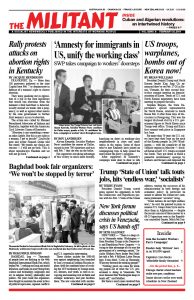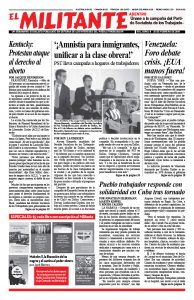NEW YORK — “There is a deep crisis in Venezuela today. Washington — from President Trump to the Democratic and Republican Party Congress — is trying to take advantage of it to oust the government of a sovereign nation,” Socialist Workers Party leader Paul Mailhot told a Feb. 9 Militant Labor Forum here. It was titled, “Crisis in Venezuela: What way forward for working people?”
“Nothing good can come for working people out of what the U.S. government is doing in Venezuela. We must demand that Washington keep its hands off,” said Mailhot.
But there is much more involved than U.S. interference, he said. U.S. imperialism has only been able to make headway because of the course of the government led by Nicolás Maduro, and by Hugo Chávez before him. This has undermined the self-confidence, political consciousness and fighting spirit of working people whose struggles go back decades.
The U.S.-dominated oil industry in Venezuela was nationalized in 1976 during the government of Carlos Andrés Pérez, Mailhot said, a byproduct of a rising labor movement. In February 1989 a rebellion sparked by the attempt of the capitalist rulers to raise gasoline and fuel prices up to 80 percent was drowned in blood by the social-democratic government of Pérez.
In 1992, then Lt. Col. Hugo Chávez was jailed after he led a failed attempt to overthrow the Pérez government. In the midst of a popular uprising in 1998, Chávez was elected president, with 700,000 supporters attending his final rally.
Trying to make capitalism serve the people
Mailhot recalled how at first Washington tried to work with Chávez and turn him into a reliable defender of their interests. When he visited New York in 1999, U.S. officials asked Chávez to bang the closing gavel at the New York Stock Exchange.
In response to the pressures of the mass movement of workers and farmers in Venezuela, Chávez was not the accommodating leader the U.S. rulers hoped. He presented himself as a strong leader, standing above the contending social classes, who could use his power to “serve the people.” His course was different to that taken by the July 26 Movement in Cuba under the leadership of Fidel Castro in their 1959 revolution — the revolutionary transformation of social relations by working people mobilized in their own class interests.
Mailhot pointed to a 2009 interview with Chávez, where he was asked about the differences between the Cuban Revolution and his perspectives for Venezuela. “Fidel is a communist. I am not,” Chávez responded. “Fidel is a Marxist-Leninist. I am not.” Chávez used income from Venezuela’s vast oil deposits to fund welfare programs. Chávez, and then his successor Maduro, used the government to try to regulate and manage capitalism, rather than mobilizing and leading working people to overturn capitalist relations and take their future into their own hands.
Chávez committed the ultimate crime in Washington’s eyes, however, by developing deep ties of solidarity with revolutionary Cuba. He turned to Cuba’s revolutionary government for help in a 2003 literacy drive. Cuba has sent tens of thousands of doctors to help provide care in working-class and remote rural areas. Under the Chávez and Maduro governments, Venezuela has sent Cuba much-needed oil.
Working people in Venezuela were looking for a way to advance their struggles. At the November 2007 Venezuela International Book Fair, Mary-Alice Waters, a leader of the Socialist Workers Party and president of Pathfinder Press, was asked to open a panel discussion on “The United States: A Possible Revolution,” the book fair’s theme. It became a rolling five-day debate. (The record of this discussion in printed in Is Socialist Revolution in the US Possible?)
Waters said that for workers and farmers in Venezuela, the overthrow of capitalist rule remains the central challenge. She said it was an “indisputable fact that what will be Venezuela’s equivalent of the mass insurrection of the toilers of Cuba that culminated in the Jan. 1, 1959, revolutionary triumph lies ahead of us, not behind.”
When oil prices were high some of the social contradictions were masked, but this course of Chávez and Maduro inevitably led to a worsening economic and political crisis.
Many workers today find their conditions of life all-consuming, and are demoralized. They spend hours in lines trying to find food and other necessities as massive inflation drives prices through the roof. Hunger is widespread. Medicine is scarce. Crime is rife. Millions have fled the country.
In these circumstances, the rallies called by the opposition-appointed president Juan Guaidó have brought out large crowds, larger than those called to support Maduro. And they’ve drawn participation from working-class neighborhoods. This situation in Venezuela today is dangerous — for working people there and for Cuba, Washington’s ultimate target.
Cuba has maintained its selfless solidarity with the Venezuelan people, Mailhot said. There remain tens of thousands of Cuban internationalist volunteers, including health workers and military advisers there. Cuba speaks out in defense of the sovereignty of the Venezuelan people against foreign interference.
The U.S. government and Guaidó — their chosen replacement for Maduro — are slandering and blaming Cuba for all violence in Venezuela.
“We have a responsibility to speak out and answer these lies,” Mailhot said. “At the same time learning the lessons of the Cuban Revolution, and taking actions that advance the independent organization, class-consciousness, self-confidence and discipline of working people are what is needed in Venezuela today. The Cuban Revolution shows what working people are capable of when they forge a revolutionary party and leadership through struggle.”

